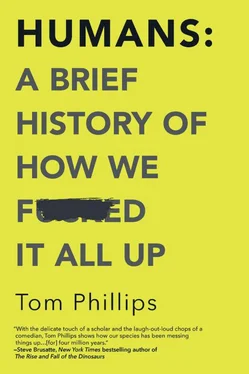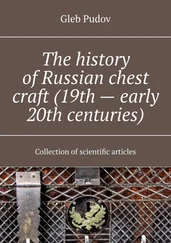Tom Phillips - Humans - A Brief History of How We F*cked It All Up
Здесь есть возможность читать онлайн «Tom Phillips - Humans - A Brief History of How We F*cked It All Up» весь текст электронной книги совершенно бесплатно (целиком полную версию без сокращений). В некоторых случаях можно слушать аудио, скачать через торрент в формате fb2 и присутствует краткое содержание. Город: Toronto, Год выпуска: 2019, ISBN: 2019, Издательство: Hanover Square Press, Жанр: История, Юмористические книги, на английском языке. Описание произведения, (предисловие) а так же отзывы посетителей доступны на портале библиотеки ЛибКат.
- Название:Humans: A Brief History of How We F*cked It All Up
- Автор:
- Издательство:Hanover Square Press
- Жанр:
- Год:2019
- Город:Toronto
- ISBN:978-1-48805-113-5
- Рейтинг книги:4 / 5. Голосов: 1
-
Избранное:Добавить в избранное
- Отзывы:
-
Ваша оценка:
- 80
- 1
- 2
- 3
- 4
- 5
Humans: A Brief History of How We F*cked It All Up: краткое содержание, описание и аннотация
Предлагаем к чтению аннотацию, описание, краткое содержание или предисловие (зависит от того, что написал сам автор книги «Humans: A Brief History of How We F*cked It All Up»). Если вы не нашли необходимую информацию о книге — напишите в комментариях, мы постараемся отыскать её.
Humans: A Brief History of How We F*cked It All Up — читать онлайн бесплатно полную книгу (весь текст) целиком
Ниже представлен текст книги, разбитый по страницам. Система сохранения места последней прочитанной страницы, позволяет с удобством читать онлайн бесплатно книгу «Humans: A Brief History of How We F*cked It All Up», без необходимости каждый раз заново искать на чём Вы остановились. Поставьте закладку, и сможете в любой момент перейти на страницу, на которой закончили чтение.
Интервал:
Закладка:
And what of Muhammad, whose jaw-dropping diplomatic incompetency was the catalyst for all this? Holed up in Bukhara’s sister city of Samarkand, the shah saw that the writing was on the wall as soon as Bukhara fell. He fled the city, and spent the next year engaged in what could be generously described as “fighting a rearguard action,” or less generously as “running away.” Genghis devoted 20,000 troops to pursuing him across his crumbling empire, with orders not to return until they’d caught or killed him. They chased him as far as the shores of the Caspian Sea, where he sought refuge on a series of islands. It was on one of those islands that—by now penniless, dressed in rags and losing his mind—Muhammad died of pneumonia in January 1221.
If Genghis had stopped his attacks once the cause of his ire was dead, then maybe Muhammad’s name would only be a historical footnote today. The trouble was, he didn’t stop. The destruction of Khwarezm continued throughout 1221, and the violence became ever more extreme. The orders to wipe out entire populations of resisting cities became explicit, as Nishapur, Gurganj, Merv and others were to find out.
And once the Khwarezmian Empire had been obliterated, Genghis… just carried on, possibly impressed by how easy it had all been. His original lack of interest in extending his empire westward had now transformed into a very strong desire to see how much more he could conquer. Much of the Asian Islamic world was gobbled up, and the Mongols pushed on into Europe. After Genghis died in 1227, his sons and grandsons continued the expansion. At its height, the Mongol Empire was the largest land empire the world has ever seen, stretching from Poland to Korea.
While it fractured after a couple of generations, descending into factionalism and in-fighting as empires often tend to do, its legacy continued in some areas for far longer—even into the twentieth century. In the emirate of Bukhara, the direct descendants of Genghis ruled until as recently as 1920, the last reign of the Khan dynasty finally ending only when the Bolsheviks came along. (In 1838, a British soldier named Charles Stoddart, on a diplomatic mission to win Bukhara over to the cause of Britain’s own empire, ironically managed to re-create Muhammad’s folly in microcosm: casually insulting Emir Nasrullah Khan for no apparent reason, he was thrown into a deeply unpleasant place known as the Bug Pit, where he spent several horrifying years having his flesh eaten by insects before finally being executed. Do not mess with the Khans.)
The culture and history and writings of many of the places the Mongols conquered were completely destroyed, entire populations were displaced and the death toll runs into uncountable millions. There is an upside, sort of: the unification and stabilization of the very trade routes that kicked off the whole affair brought about a continent-spanning cultural exchange that helped jump-start the modern age across much of Eurasia. The downside to that is that they exchanged diseases as well as culture, including the bubonic plague, which killed millions more.
And all because a man with a fragile ego decided that diplomacy was for losers, and that a simple request for a trade deal had to be some kind of nefarious plot. Ala ad-Din Muhammad, you fucked up, my son.
Inca ruler who in 1532 made a similar mistake to Moctezuma when faced with a Spanish incursion, except he improved on it by getting drunk before meeting the Spanish, and leading his troops into a really obvious trap.
Fifth-century British ruler who—lacking defenses against the Picts following Roman withdrawal—reputedly invited Saxon mercenaries to stay in Britain to fight for him. The Saxons decided to just take over instead.
Paraguayan leader who managed to get his relatively small country into a war with the much larger countries of Brazil, Argentina and Uruguay. It’s estimated that more than half of his country’s population died.
In 1917, Germany sent a secret telegram to Mexico offering a military alliance if the USA joined World War I—and promising them Texas, New Mexico and Arizona. When the British intercepted it, all it did was encourage the US to join the war (and Mexico wasn’t even interested).
9
The Shite Heat of Technology
The human compulsion to explore and to always seek out new horizons is—as I think we’ve mentioned already—one of our defining characteristics. It was that urge to explore and to uncover new knowledge that drove NASA to launch the Mars Climate Orbiter into the vast, empty black void of space in 1998.
A few months later, the Mars Climate Orbiter ended up crashing onto a load of rocks, like an idiot.
In a spectacular demonstration of humanity’s ability to make essentially the same mistakes over and over again, a little more than five centuries after Christopher Columbus messed up his units of measurement, got his sums wrong and ended up running aground on the Americas, the people behind the Orbiter messed up their units of measurement, got their sums wrong and ended up falling to the ground on Mars.
Humanity’s next great step on our journey through history, the scientific revolution, began in the sixteenth century in the letters and books being exchanged by philosophers across Europe. To begin with, it wasn’t really so much a revolution as a catch-up session; quite a lot of it was just rediscovering knowledge that had already been worked out by previous civilizations. But hand in hand with the rise of global travel, conquest and trade—always hungry for new knowledge and new technology—over the next few centuries it produced a huge expansion in our understanding of the world. It didn’t just give us lots of science, it gave us the idea of science itself, as something that was a distinct discipline with its own methods rather than just being one variant of “having a bit of a think.”
The pace of technological change continued to accelerate until, in towns across northern Britain in the seventeenth and eighteenth centuries, fueled by cheap American cotton from slave plantations, another revolution started taking place. This time it was in manufacturing methods, with the rise of the machines enabling production on a mass scale—something that would spread around the world and change forever our cities, our environment, our economies and our ability to order a foot spa off Amazon at 3:00 a.m. while drunk.
The dawn of the scientific, technological and industrial ages have brought opportunities to humanity that our ancestors could never have dreamed of. They have also, unfortunately, offered us the chance to fail on a scale never previously anticipated. When Columbus got his units of measurement wrong, he was at least confined to making his mistakes on the surface of the earth. Now, as the unfortunate story of the Mars Climate Orbiter shows, we get to screw up in space .
The failure of the Orbiter only started to become apparent several months into the mission, when attempts by mission control to make minute adjustments to the spacecraft’s trajectory in order to keep it on course started to not quite have the effect they were intended to. But quite how wrong it had gone only became apparent when the craft reached Mars and attempted to go into orbit, only to lose contact with ground control almost immediately.
The investigation afterward revealed what had happened: the Orbiter was using the standard metric unit of Newton seconds to measure impulse (the total amount of thrust applied in a maneuver). But the software on the ground computer, supplied by a contractor, was using imperial measurements of pound seconds. Every time they’d fired the ship’s engines, the effect had been more than four times as much as they’d thought—with the result that the Mars Orbiter ended up over a hundred miles closer to the surface of Mars than it was supposed to. As it tried to go into orbit, it instead hit the atmosphere hard, and the cutting-edge $327 million spacecraft broke into pieces almost instantly.
Читать дальшеИнтервал:
Закладка:
Похожие книги на «Humans: A Brief History of How We F*cked It All Up»
Представляем Вашему вниманию похожие книги на «Humans: A Brief History of How We F*cked It All Up» списком для выбора. Мы отобрали схожую по названию и смыслу литературу в надежде предоставить читателям больше вариантов отыскать новые, интересные, ещё непрочитанные произведения.
Обсуждение, отзывы о книге «Humans: A Brief History of How We F*cked It All Up» и просто собственные мнения читателей. Оставьте ваши комментарии, напишите, что Вы думаете о произведении, его смысле или главных героях. Укажите что конкретно понравилось, а что нет, и почему Вы так считаете.












